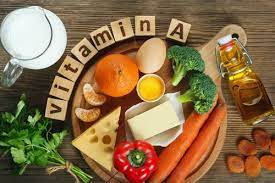Why Choosing Nutrient-Dense Foods is More Important than Counting Calories

The great debate some would say, "Not us though" Yep we're a little biased on this subject so prepare to possibly get offered 😂
We're open minded and honest so you will always get a strong backed answer with us.
Lets dive into why Nutrient density is more important than just calories in...
Have you ever heard the saying, "you are what you eat"? Well, it's truer than you may think. The food you consume has a significant impact on your health and well-being, and it's not just about the number of calories you take in.
The quality of the food you consume is much more important. That's why choosing nutrient-dense foods is more critical to thriving in life than counting calories.
"But Chris, I like get my calories in with my own flexible diet. Look thats all good in the hood but it's all about you prioritising the risk to ratio scale for example can I eat 70% good and 30% rubbish or what are you happy with sacrificing that works in your lifestyle because at the end of the day its your choice with the way you want to live"
Imagine eating your recommended calories, but never actually feeling alive, that's something you may notice in society today, people are eating more than ever but still seem to feel anxious, depressed and tired.
Nutrient-dense foods are those that are high in essential vitamins, minerals, and antioxidants.

What Are Essential Vitamins?
Essential vitamins are crucial components of a healthy diet that perform various functions in the body. These vitamins cannot be produced by the body and must be obtained through diet or supplements.
Here are the main functions of some of the most important essential vitamins:
-
Vitamin A: Helps maintain healthy skin, eyesight, and immune function.
-
Vitamin B1 (Thiamine): Assists in energy production and supports the nervous system.
-
Vitamin B2 (Riboflavin): Helps the body release energy from carbohydrates and supports eye and skin health.
-
Vitamin B3 (Niacin): Supports energy production, healthy skin, and proper function of the nervous system.
-
Vitamin B6 (Pyridoxine): Supports the production of neurotransmitters and helps the body produce red blood cells.
-
Vitamin B9 (Folic Acid): Essential for proper cell growth and development, particularly during pregnancy.
-
Vitamin B12 (Cobalamin): Supports the nervous system and helps produce red blood cells.
-
Vitamin C: Supports the immune system, promotes healing, and helps the body absorb iron.
-
Vitamin D: Helps the body absorb calcium, maintaining strong bones and teeth.
-
Vitamin E: Antioxidant that helps protect the body from damage caused by free radicals.
Getting enough of these essential vitamins is important for overall health and preventing deficiencies that can lead to various health problems. It is recommended to obtain vitamins from a balanced diet including a variety of fruits, vegetables, whole grains, and lean proteins. However, if necessary, supplements can be considered under the guidance of a healthcare professional.
The Negative Impact of Not Getting Enough?
Not getting enough essential vitamins can lead to various deficiencies and negatively impact your health. Here are some of the consequences of lacking specific vitamins:
-
Vitamin A deficiency: Can lead to poor vision, particularly in dim light, and an increased risk of infections.
-
Vitamin B1 deficiency: Can cause fatigue, irritability, muscle weakness, and decreased appetite.
-
Vitamin B2 deficiency: Can result in skin lesions, eye problems, and mouth sores.
-
Vitamin B3 deficiency: Can cause skin issues, diarrhoea, and dementia.
-
Vitamin B6 deficiency: Can cause anaemia, depression, and confusion.
-
Vitamin B9 deficiency: Can increase the risk of birth defects in newborns and can lead to anaemia.
-
Vitamin B12 deficiency: Can cause anaemia, nerve damage, and cognitive decline.
-
Vitamin C deficiency: Can lead to weakness, fatigue, and increased susceptibility to infections.
-
Vitamin D deficiency: Can cause rickets in children and osteomalacia in adults, leading to weakened bones and increased risk of fractures.
-
Vitamin E deficiency: Can cause neurological problems, such as loss of coordination and muscle strength.
It's important to eat a balanced diet that includes a variety of fruits, vegetables, whole grains, and lean proteins to get enough of these essential vitamins. If necessary, supplements can be considered under the guidance of a healthcare professional to avoid deficiencies and maintain optimal health.

What Actually Are Minerals?
Minerals are essential nutrients that play important roles in our bodies, including building strong bones, regulating heartbeat and supporting proper muscle function.
Whats the Benefits Getting Enough and The Negatives of Not Getting Enough Minerals?
Here are some of the key minerals and the benefits and consequences of lacking them:
-
Calcium: Helps build and maintain strong bones, regulates heart and muscle function, and helps transmit nerve impulses. Deficiency can cause weak bones and increase the risk of osteoporosis.
-
Iron: Essential for the production of haemoglobin, which carries oxygen in the blood. Deficiency can lead to anaemia and fatigue.
-
Magnesium: Helps regulate nerve and muscle function, supports a healthy immune system, and helps regulate blood sugar levels. Deficiency can cause muscle weakness, fatigue, and irregular heartbeats.
-
Zinc: Helps with wound healing, supports the immune system, and is necessary for taste and smell. Deficiency can cause stunted growth, weakened immunity, and skin problems.
-
Potassium: Helps regulate fluid balance and supports proper muscle and nerve function. Deficiency can cause muscle weakness, fatigue, and heart problems.
-
Sodium: Helps regulate fluid balance and blood pressure. Excess intake can lead to high blood pressure and other health problems.
-
Iodine: Essential for thyroid function and healthy growth and development. Deficiency can cause hypothyroidism and mental retardation.
-
Chromium: Helps regulate blood sugar levels and is necessary for proper insulin function. Deficiency can lead to insulin resistance and an increased risk of type 2 diabetes.
Getting enough minerals through a balanced diet that includes whole grains, fruits, vegetables, lean proteins, and dairy products is important for optimal health. If necessary, supplements can be considered under the guidance of a healthcare professional.

Antioxidant.. What's That?
Antioxidants are substances that protect our cells from damage caused by harmful molecules known as free radicals. These free radicals can cause oxidative stress, leading to chronic diseases and the ageing process.
Whats the Benefits Getting Enough and The Negatives of Not Getting Enough Antioxidants?
Antioxidants play a crucial role in maintaining good health and preventing chronic diseases.
Some of the key benefits of antioxidants include:
-
Reducing the risk of chronic diseases: Antioxidants have been shown to reduce the risk of chronic diseases such as heart disease, cancer, and Alzheimer’s disease.
-
Protecting against cellular damage: Antioxidants help to protect our cells from damage caused by free radicals, thus reducing the risk of chronic diseases and the ageing process.
-
Supporting a healthy immune system: Antioxidants play an important role in maintaining a healthy immune system by neutralising free radicals and reducing oxidative stress.
-
Improving skin health: Antioxidants can help to improve skin health by protecting against sun damage and reducing the appearance of fine lines and wrinkles.
Some of the most commonly known antioxidants include vitamin C, vitamin E, beta-carotene, and selenium.
Each of these antioxidants has unique properties and benefits. For example, vitamin C helps to boost the immune system and support skin health, while vitamin E helps to protect cells from damage and improve skin health.
However, not getting enough antioxidants can have negative impacts on our health. A diet lacking in antioxidants can increase the risk of chronic diseases, impair the immune system, and accelerate the ageing process. It can also lead to a greater risk of developing conditions such as heart disease, cancer, and cognitive decline.
Therefore, it is important to ensure that we consume a balanced diet that includes a variety of nutrient-dense foods that are rich in antioxidants.
This can help to protect our health and reduce the risk of chronic diseases. Some of the best sources of antioxidants include fresh fruits and vegetables, whole grains, nuts, and seeds. By incorporating these foods into our diets and making them a regular part of our eating habits, we can support our health and well-being for years to come.
They are also low in calories, which means that you get more nutrients per calorie consumed. In contrast, calorie-dense foods are often high in unhealthy fats, sugar, and salt, and are low in essential nutrients.
Why are Nutrient-Dense Foods Important?
Your body needs a variety of vitamins, minerals, and antioxidants to function properly and maintain optimal health.
Some of the key nutrients your body needs include vitamins A, C, D, and E, as well as minerals like iron, calcium, and magnesium.
A diet rich in these nutrients can help to boost your energy levels, improve your mood, support a healthy immune system, and even reduce the risk of chronic diseases like heart disease, cancer, and diabetes.
"Think of your body like a car engine. Just as a car engine needs high-quality fuel to run smoothly, your body needs high-quality nutrients to function optimally. If you don't give your body the right fuel, it won't run at its best."
The Negative Effects of a Lack of Essential Nutrients
If you don't get enough essential nutrients, your body can suffer...
For example, a lack of iron can lead to anaemia, a condition where your body doesn't have enough red blood cells to carry oxygen to your tissues. A lack of calcium can lead to weak bones and a higher risk of osteoporosis. And a lack of vitamin D can lead to a weakened immune system and a higher risk of bone fractures.
Studies have shown that a diet lacking in essential nutrients can also have a negative impact on mental health. For example, a study published in the American Journal of Clinical Nutrition found that a diet lacking in vitamins B and C was associated with an increased risk of depression.
How to Choose Nutrient-Dense Foods
-
Focus on whole, unprocessed foods: Choose foods that are as close to their natural state as possible, such as fruits, vegetables, whole grains, nuts, and seeds.
-
Go for color: Brightly coloured fruits and vegetables are typically high in essential nutrients like vitamins A and C.
-
Support local farmers: Buying local, seasonal produce not only supports your local economy, but it also ensures that you are getting the freshest, most nutrient-dense foods possible.
-
Read food labels: Look for products that are high in essential vitamins and minerals and low in unhealthy fats, sugar, and salt.
-
Limit processed foods: Processed foods are often high in unhealthy additives and low in essential nutrients.
By choosing nutrient-dense foods, you can give your body the fuel it needs to function at its best.
Not only will you feel better, but you'll also be doing your part to support the health of your body and the planet.
Making a Personal Commitment
As much as we all know the importance of choosing nutrient-dense foods, it can be challenging to put it into practice. Life is busy, and it's easy to fall into the trap of grabbing convenience foods on the go but if you take the time "10 minutes" to plan your week you will create the opportunity to giveback to yourself, your family and the community..
All in all, we believe change starts with you taking responsibility in life and it's not up to us to tell you what to do but for you to be resourceful enough to learn the fundamental skills you need to create those habit changes with the information provided.
Health Disclaimer
This information is not intended to diagnose, treat, cure, or prevent any disease and is provide for research and education purposes only.
This information does not constitute medical advice and it should not be relied upon as such. Consult with your doctor before modifying your regular lifestyle regime.

Chris is a Certified Personal Trainer, Strength and Conditioning Coach, Sports Nutrition Advisor, Breathing Performance Coach, Cognitive Behavioural Therapist Coach, Over 10 years experience in the health and fitness industry, while also running his own businesses since 2014 allowing him to implement and practice tools that allowed him to thrive in life.
In the past Chris experienced first hand on how to overcome his own severe anxiety and depression through changing lifestyle habits and behaviours through holistic health.











Leave a comment